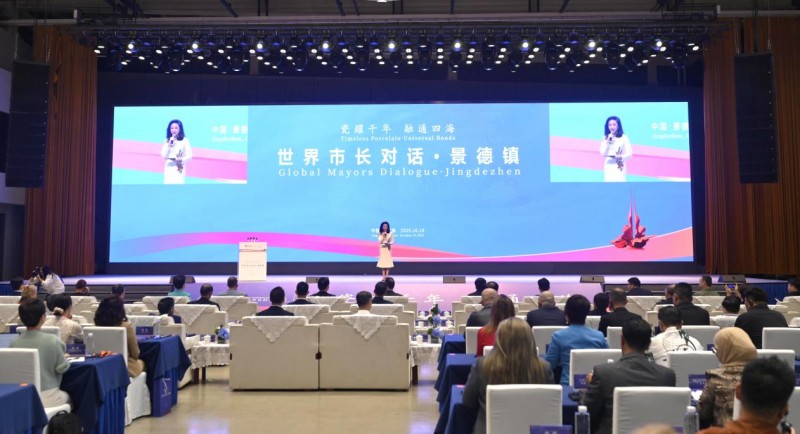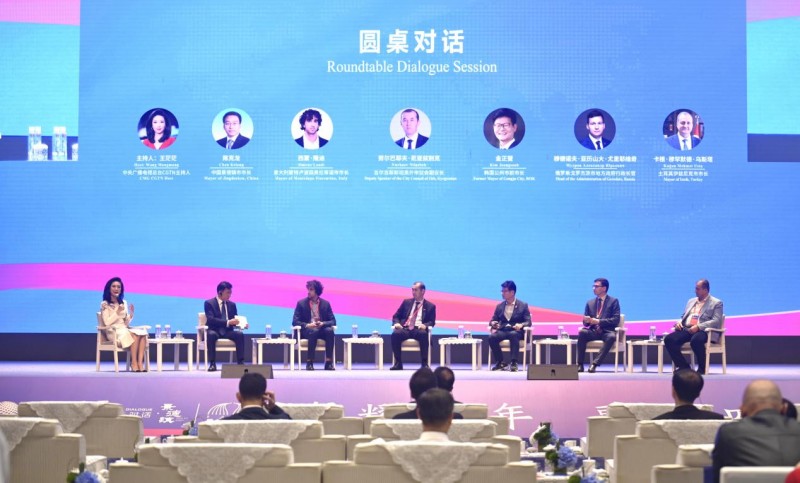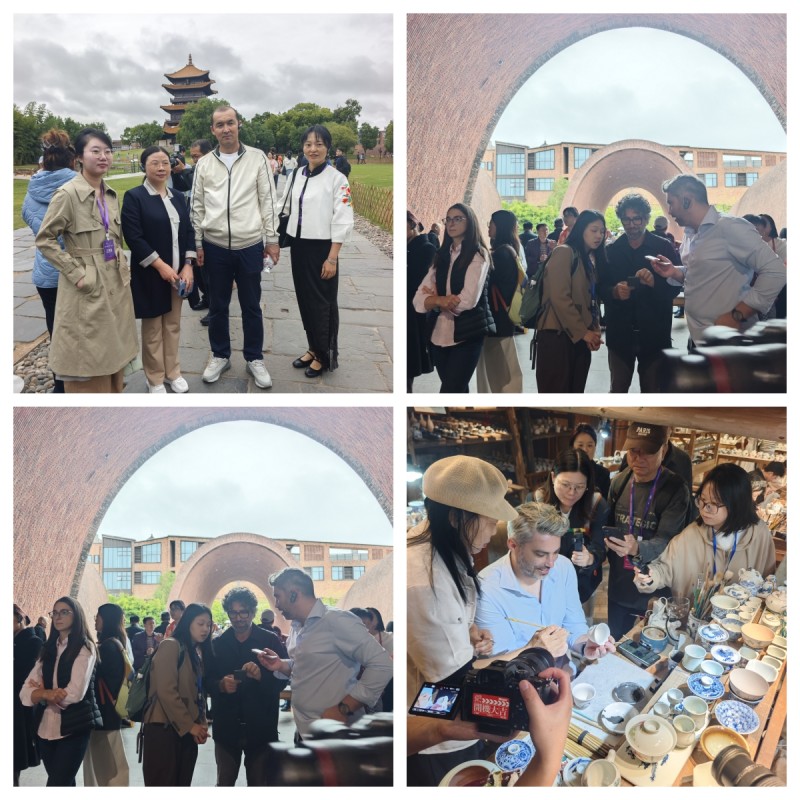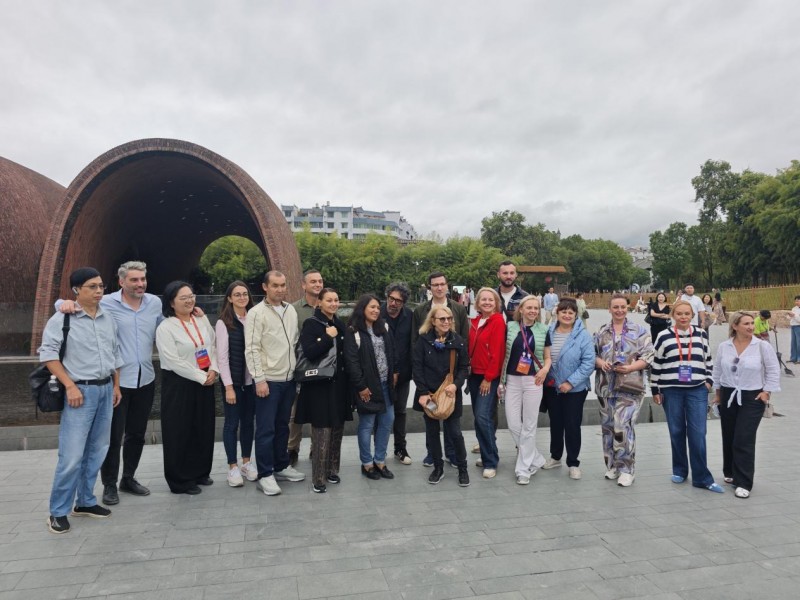World Mayors Dialogue · Jingdezhen and the 2025 Jingdezhen Forum Held
发布时间:2025-10-20 10:10:02来源:互联网
(Jiangxi, China — reporters Zhou Wanli and Guo Minjun, Greater Bay Times)
On October 19, 2025, the World Mayors Dialogue · Jingdezhen and the 2025 Jingdezhen Forum took place at the Taoxichuan Grand Hall in Jingdezhen, drawing more than 350 participants from home and abroad.

Attendees included Wan Guangming, Member of the Party Leadership Group and Vice Governor of Jiangxi Province; Cheng Guoping, Vice President of the China Association for International Understanding and former Vice Minister of Foreign Affairs; Hu Xuemei, Secretary of the CPC Jingdezhen Municipal Committee; Chen Kelong, Deputy Secretary of the CPC Jingdezhen Municipal Committee and Mayor of Jingdezhen; Simone Londi, Mayor of Montelupo Fiorentino, Italy; Nurbayev Niyazbek, Deputy Chairman of the Osh City Council, Kyrgyzstan; Kim Jeong-seop, former Mayor of Gongju, South Korea; Alexander Yuryevich Mudnov, Head of the Local Administration of Gorodets, Russia; and Çağan Muhammed Usta, Mayor of İznik, Turkey. The delegation also included representatives from Florence and Venice (Italy), Troyan (Bulgaria), Talavera (Spain), and Niger State (Nigeria), as well as 17 international media organizations, artists from 18 countries, delegates from China’s major ceramic-producing regions, and representatives from the cultural and tourism sectors.

Wan Guangming, on behalf of the Jiangxi provincial government, extended a warm welcome to all guests. He said the forum aims to explore new paths for integrating culture and tourism, promoting prosperity through openness, and preserving and transmitting civilization — objectives that are timely and far-reaching. He described the event as a vivid implementation of Xi Jinping Thought on Culture and as Jiangxi’s contribution to the Global Civilization Initiative. Wan encouraged open, in-depth exchanges that would spark new ideas and build consensus for cooperation. He also invited guests to visit Jiangxi frequently to experience its “unique, picturesque” scenery and the enduring charm of Gan-Po culture, and to bring Jiangxi’s stories to the world.

In his remarks, Cheng Guoping emphasized that in an interconnected world, strengthening mutual understanding and cooperation between cities — key spaces of human life and engines of civilization — is essential. He praised Jingdezhen for leveraging its deep cultural heritage and openness to realize President Xi Jinping’s call to “build new platforms for international cultural exchange.” Cheng affirmed that the China Association for International Understanding will continue to act as a bridge to support deeper cooperation between Chinese cities and their international counterparts in culture, tourism, and trade.
Hu Xuemei highlighted Jingdezhen’s millennia-old kilns and its long-standing role as a global hub for porcelain. She noted the city’s efforts to advance the National Ceramic Culture Inheritance and Innovation Pilot Zone, sustain its thousand-year cultural lineage through “porcelain-city symbiosis,” integrate culture and tourism to create compelling cultural experiences, and provide a platform for civilizational exchange. Hu expressed hope that the forum would generate new insights and practical outcomes, and she pledged that Jingdezhen will use the event as an opportunity to collaborate with cities worldwide to explore new development pathways, expand trade cooperation, and foster cultural prosperity.
Nurbayev Niyazbek described Jingdezhen as not merely a city but a historical and spiritual homeland of world ceramics. He called porcelain an ambassador of peace that conveys a people’s aesthetics, craftsmanship, and philosophical ideas. He thanked Jingdezhen for continuously inspiring the world through art and called for deeper cultural exchange and experience-sharing to strengthen civilization as a bridge between nations.

During the roundtable dialogue, Mayor Chen Kelong and mayors and delegates including Simone Londi, Nurbayev Niyazbek, Kim Jeong-seop, Alexander Mudnov, and Çağan Usta discussed three themes: “Cultural and Tourism Beauty,” “Openness and Prosperity,” and the “Transmission of Civilization.”
Chen Kelong observed that while cities differ, they are united by a shared pursuit of beauty, the inheritance of civilization, and a desire for shared prosperity. He said Jingdezhen has long been an open and inclusive city; in the new era it is expanding its global engagement by both “going out” and “inviting in.” Jingdezhen is prepared to share its experience so that the beauty of the “Porcelain Capital” can meet the world and its ceramic culture can flourish anew.
Simone Londi, whose hometown Montelupo also has a strong ceramic tradition, praised Jingdezhen for integrating ceramic elements into urban design, giving the city a pervasive cultural character — an approach he intends to adapt in his own city.
Kim Jeong-seop recalled the discovery of a tomb in Gongju containing ceramics similar to those unearthed in Nanjing, suggesting cultural exchanges between the regions dating back 1,500 years. He expressed hope that deeper dialogue could foster new collaborative opportunities.
Alexander Mudnov commended Jingdezhen’s protection of folk craftsmanship and proposed researching both sides’ economic and cultural characteristics to develop mutually beneficial projects.
Çağan Usta said that 35 Turkish cities have formed a Silk Road Association and noted İznik’s strengths in design and the arts. He expressed interest in cooperating with Jingdezhen to protect traditional crafts and promote the ceramics industry through international collaboration.
After the forum, Chinese and international media interviewed participating mayors and guests, who shared insights and experiences in urban development. From October 18 to 19, delegates visited the China Ceramics Museum, the Taoxichuan cultural and creative district, and the Taoyangli historic and cultural block as part of a guided cultural tour of Jingdezhen.
免责声明
【慎重声明】 凡本站未注明来源为“默认站点”的所有作品,均转载、编译或摘编自其它媒体,转载、编译或摘编的目的在于传递更多信息,并不代表本站赞同其观点和对其真实性负责。 如因作品内容、版权和其他问题需要同本网联系的,请在30日内进行!